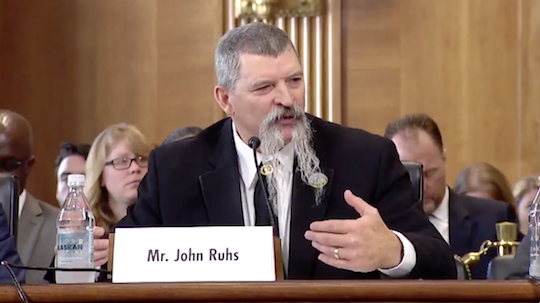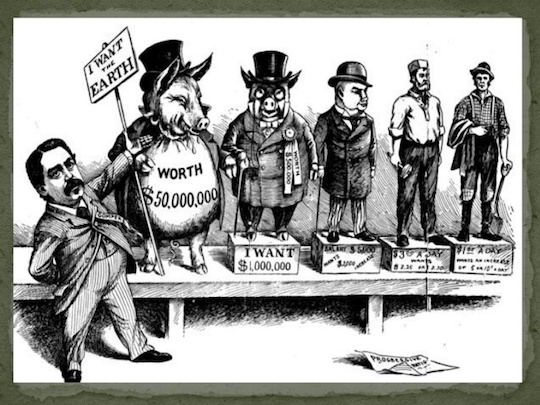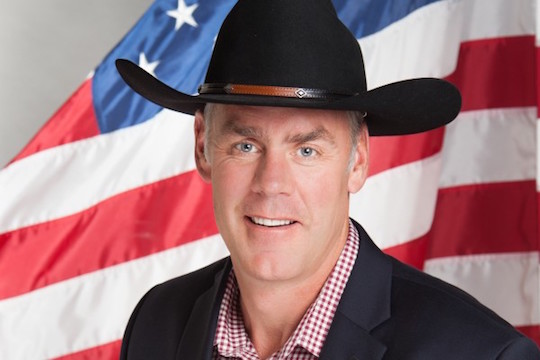The big historical misconception of the Gilded Age is that it was an age of great wealth, when really it was an age of widespread poverty. Between 1870 and 1900, growing industrialization and the sudden interconnection of markets by rail made a small number of American industrialists insanely rich. The Gilded Age produced the Rockefeller, Vanderbilt, and Carnegie fortunes. It also impoverished millions of ordinary Americans, who went from self-employment as small farmers and independent craftsmen to working in mills and on railroads—often for sprawling trusts, usually with little control over hours or conditions, and invariably for low wages in an economy driven by industrial-strength inflation. The Gilded Age made a few people rich at the expense of everyone else. It is named for the 1873 novel by Mark Twain, and the whole point of “gilded” is that the gold only covered the surface. Beneath it lay something base that the wealthy wanted to cover up. Anyway, I don’t know why I’m thinking about this in the 21st century, during our second industrial revolution. I guess I’m just savoring the fact that nothing like that could happen now. Today is Friday, and our age remains totally un-gilded. Won’t you insist that everything is fine with me?
Tag Archives: zinke
Ryan Zinke warns oil reps of disloyalty in Interior
Secretary of the Interior Ryan Zinke gave one heck of a speech to the National Petroleum Council yesterday, telling the industry group that he planned to move the Bureau of Land Management out of Washington and into an unspecified western state. He also said that one third of the employees in the Department of the Interior were not loyal to him or President Trump. That made headlines, but my favorite part of the story is the secretary’s nautical metaphor. Zinke told the assembled oil company reps that he knew when he took over Interior, “I got 30 percent of the crew that’s not loyal to the flag.”
That’s the old Zinke charm, right there: by analogizing everything to the Navy, he makes his career as a SEAL the prerequisite for whatever job he has been called on to do. Of course, one side effect of this metaphor is that it conflates loyalty to the United States with loyalty to Trump. If Zinke is correct, and a third of his department is resisting his agenda from within, maybe it’s because they are more loyal to the Department of the Interior than to this particular administration. The new secretary’s plan is to radically restructure the department, after all. Perhaps they’re not on board with his changes because they have a bunch of experience, whereas Zinke has seen fit to re-envision a whole department in the executive branch despite never having done anything like this before. That’s the Trump administration’s promise, though: they’re going to completely change Washing by drawing on the wisdom they have gained by never working in it.
Anyway, best of luck to Commander Zinke in rooting out the traitors in his midst. I also wish him luck in his ongoing plan to protect public lands, a commitment that defined his politics right up until he stopped needing to win elections. On a completely unrelated note, here’s the other fun quote from the AP’s report:
Zinke also offered a quirky defense of hydraulic fracturing, a drilling technique also known as fracking that has led to a years-long energy boom in the U.S., with sharply increased production of oil and natural gas.
“Fracking is proof that God’s got a good sense of humor and he loves us,” Zinke said without explanation.
BLM Deputy: Zinke monuments memo was not fact-checked

BLM Acting Deputy Director John Ruhs testifies on fact-checking in Interior and, presumably, the mines of Moria
On Twitter this morning, Sen. Mark Heinrich (D-NM) alleged that there were “basic factual errors” in the recommendation on national monuments that Secretary of the Interior Ryan Zinke submitted to President Trump last month, including the claim that monument designation had reduced hunting access in New Mexico. According to local BLM staff, hunting access has improved under monument designation. Noting that these facts appear to contradict Zinke’s report, Heinrich asks John Ruhs, the Acting Deputy Director of the Bureau of Land Managment, whether the secretary’s office consulted local BLM officials before drafting its report. In this video, Ruhs said the secretary’s office did not consult local BLM officials. Neither did it ask the BLM to fact-check Zinke’s memo.
That memo was previously kept secret, but it leaked this weekend. In it, Zinke recommends shrinking 10 national monuments designated under the Antiquities Act by previous presidents, mostly Barack Obama. He also makes several assertions that Outside magazine describes as “lies.” To be fair, some of what Outside criticizes are not claims of fact. But taken altogether, Zinke’s memo suggests that he formed his plan to reduce national monuments first and went looking for evidence second.
Back in May, Energy & Environment News reported that Interior had suspended meetings with Resource Advisory Councils, the local groups that have advised on federal land management decisions since 1996. Zinke did, however, consult a different group of stakeholders: oil companies. According to personal schedules obtained by the Washington Post under the Freedom of Information Act, during the first two months after he was confirmed, Secretary Zinke held “more than a half-dozen meetings with executives from nearly two dozen oil and gas firms…including BP America, Chevron and ExxonMobil.” He also met with Bakken oil magnate and 39th-richest American John Hamm, who is head of the American Petroleum Institute.
Such meetings account for one of the most technically true claims in Zinke’s report to president Trump, that public comments on the issue of shrinking national momuments “can be divided into two principal groups.” That is correct only in the sense that 99.2% of public comments received by the Department of the Interior wanted the monuments to stay at their current size. The other 0.8% felt differently. But this dividing of the more-than-99-percent and the less-than-one-percent into “two principal groups” was not a deliberate attempt to mislead the president. Zinke must have believed that 0.8% was significant, because he sided with them.
Taken together, these behaviors suggest that the secretary had a conclusion in mind when he set out to gather information about national monuments. That conclusion coincided with the wishes of resource extraction companies and contradicted the preference of the general public. Despite Zinke’s statements about consulting “stakeholders,” he took active steps to stop hearing from local groups invested in land management decisions. He didn’t even bother to ask BLM if what he was telling the president was true. These behaviors suggest one of two scenarios:
- Interior Secretary Zinke is bad at his job, or
- Interior Secretary Zinke knew what the president would want to hear and told him that.
So is he a yes-man or an incompetent? Neither possibility comports with the image Commander Zinke has projected throughout his political career. Neither do the recommendations in his memo square with his professed commitment to preserving public lands. I’m sure there’s a reasonable explanation for why Zinke proceeded according to the principle of Just Sayin’ Stuff in order to produce a factually inaccurate memo to the president, and why his actions during the first six months of his tenure as an appointed official in the executive branch have diverged so sharply from the values he professed as an elected legislator from Montana. I would like to hear them. I suspect we all would.
Ryan Zinke’s shrinking commitment to public lands
A big part of living in Montana is being the most Montana person you can be. This principle is especially important in politics, where conventional wisdom holds that voters will select the most authentic Montanan on the ballot—as measured in hunting, fishing, shooting, fencing mending, suspiciously mint condition Carhartt-wearing, et cetera. At one point during the special election this spring, both candidates for US House were running ads where they shot TVs. One was a musician and the other a tech entrepreneur, but no matter—once the election came around, they were rooting, tooting ranch hands.
But nobody does Montana Values better than the man they were vying to replace, Ryan Zinke. The secretary of the interior and erstwhile representative from Montana is a former Navy SEAL. He played college football. He grew up in Whitefish, the Santa Barbara of Montana, and was rumored to live in the Santa Barbara of California, but he made up for it by wearing a giant cowboy hat. In the statewide costume pageant that is Montana politics—at least as various local consultants perceive it—Zinke is a past master. Since he joined the executive branch, however, his game has fallen off.
Besides appearing next to a fencing with perfectly clean and unlined rawhide gloves, the one issue Montanans agree on more than any other is public lands. Polls put voters’ support for stream access, federal stewardship, and other land-use issues as high as 90 percent. Commander Zinke was a staunch defender of public lands when he was beholden to those voters, going so far as to resign his position as a delegate to the Republican National Convention over the plank in his party’s platform that called for transfer of federal lands to the states.
Now, though, Zinke is in an appointed position, and nothing short of a new president can push him out. Coincidentally, his position on public lands has evolved. Last week, he submitted a plan to President Trump to reduce the size of several national monuments, including Bears Ears in Utah. The details of this plan are secret; Zinke neither made his plan public nor answered questions about it put to him by the Associated Press. He prefers to do the public’s business the Montana way: in private. You can read all about it in this week’s column for the Montana Independent, in which I praise Secretary Commander Zinke for upholding his Montana values. We’ll be back tomorrow with Friday links!
Representative Commander Ryan Zinke, R-Montana, a career
Montana sends only one delegate to the United States House of Representatives, and for the last two years it was Republican and former Navy SEAL Commander Ryan Zinke. Zinke won re-election in November, but he vacated his seat last week after the Senate confirmed him as President Trump’s Secretary of the Interior. Until we pick a new one via special election in May, Montana will go without representation in the House. This situation turns out to be not so different from the one we enjoyed already.
Zinke ends his career as a congressman having sponsored no bills that actually became law. That’s not so unusual for a freshman representative. What set him apart was his flair for the dramatic—his ability to present a wild caricature of Montana values while, again, not actually expressing those values in the form of legislation. But who cares about influencing the US government when your representative used to be a Navy SEAL? Sure, he missed 80 of 99 House votes after he was nominated for Interior. But he also gave us this photograph:
God, I’m going to miss that. Remember when he said President Obama shouldn’t have attended the Paris Climate Summit because it did nothing to stop ISIS? And then a few weeks later opposed background checks at gun shows, also because it wouldn’t stop ISIS? Communications from his office consistently referred to him as Commander Zinke instead of Representative Zinke—part of a relentless branding strategy that even extended to his duties as a rep. He co-sponsored the Draft American Daughters Act, a satirical bill to register women for the draft that expressed his opposition to letting them take combat specializations. This bill also did not pass. Again, nothing Commander Zinke proposed to the House ever passed. But what fun we had!
Now he runs the Department of the Interior, a position that will make his gung-ho performance art more difficult. It’s hard to connect the Interior to foreign terrorism. I believe Commander Zinke can keep making politics more like pro wrestling, though. It was a heartening sign when he rode a horse to his first day of work last week. Seriously—you can read all about it in this week’s column for the Missoula Independent. Montana has not lost much of a legislator, but we must bid farewell to one hell of a showman. I can’t say I agreed with his politics too often. But I love a character, and Commander Zinke has certainly been that. We’ll be back tomorrow with Friday links!





